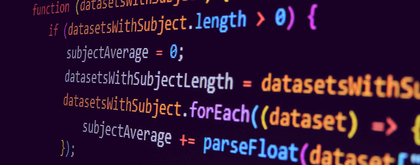The difference between Java and PHP, how do you choose the right programming language?
In the world of software development, there are countless programming languages to choose from. At SST Software, we select the best programming language for each project. We often choose between Java or PHP. Both programming languages have their own strengths and differences. The choice between Java and PHP depends on several factors. In this article, we will discuss the main differences between Java and PHP and when we might choose one of these programming languages.

Java programming language
Java is a programming language known for its stability and reliability. It is often used for the development of large-scale enterprise applications. Java code is compiled into bytecode, which is then executed by the Java Virtual Machine (JVM). This means that Java applications are platform-independent and can run on various operating systems.
PHP programming language
On the other hand, we have PHP, a programming language mainly used for web development (web applications). PHP has matured significantly in recent years. Because PHP is so popular for web development, there are many Open Source components and frameworks, such as Symfony or Laravel, available that speed up the development process.

Choosing between programming languages
One of the most important factors when choosing between Java and PHP is the nature of the project. If you are working on a large-scale, complex application where you need a lot of control over each process of your software, then Java is often the best choice. Java's strong typing and strict compile-time checks ensure robust code and reduce the chance of errors. In addition, Java has extensive support for multithreading, which can be useful when developing scalable applications that can handle high loads. We often use this for software that controls machines, or software with many (heavy) calculations.
On the other hand, if you want to build a dynamic web application with features like e-commerce links, surveys, etc., then PHP is definitely a good choice. PHP is particularly suitable for developing web applications due to the large amount of available Open Source code. These components provide ready-made solutions for common web development tasks, thereby accelerating the development process.
Scalability and performance
Finally, it is important to consider the scalability and performance of the programming language. Generally, Java performs better when processing large numbers of concurrent requests and has good scalability. However, PHP has made significant improvements in terms of performance and scalability and is much faster today than it was in the past. For some web applications, the choice between Java and PHP will not have a significant impact on performance, and it can simply be a corporate policy of our client to prefer one or the other, or the update policy of the various programming languages may be decisive.

In short: Choose Java if you are working on a large-scale, complex application with a lot of business logic and need for robust code and scalability. Choose PHP if you want to build a dynamic web application with a focus on speed of development and availability of frameworks. Both programming languages have their place in the world of web and software development, and choosing the right language depends on your specific project requirements and the expertise of the development team.
Can we help you?
At SST, we work (among other) with both Java (Spring framework) and PHP (Symfony, Laravel), and we discuss which programming language best suits your requirements. Are you interested how we can help you? Please contact us!
welcome solution





